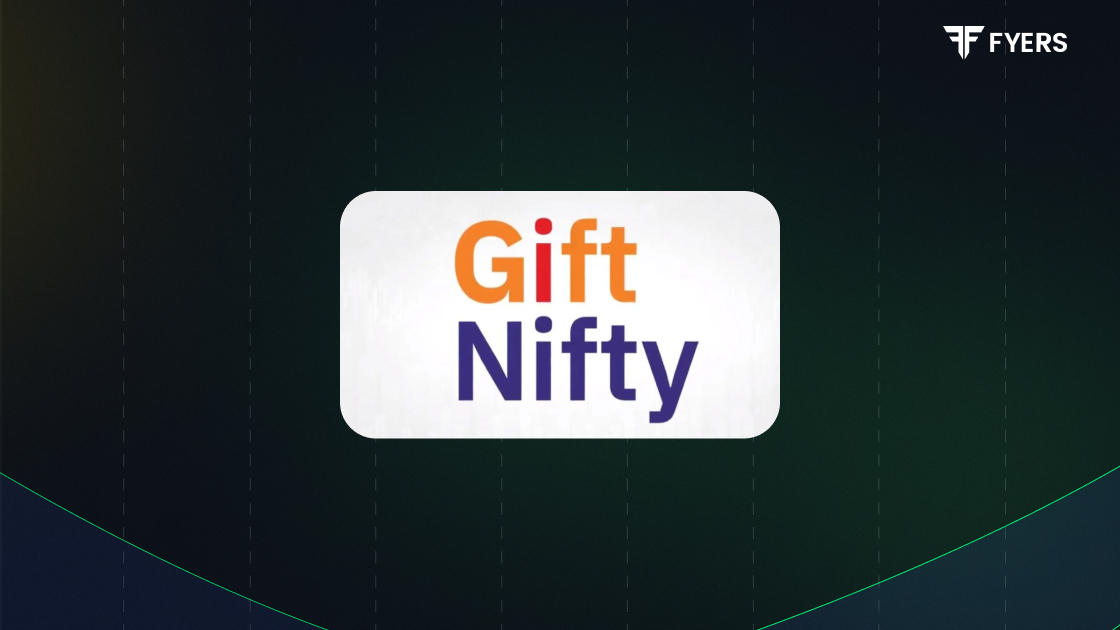

 25 Sep, 2024
25 Sep, 2024
 5 mins read
5 mins read

India is one of the fastest-progressing economies across the globe. This has increased the confidence of international and domestic investors, opening new investment avenues and positioning India as a global financial hub. A step further in this direction is establishing GIFT City in Gujarat. GIFT City is India’s first International Financial Services Centre. GIFT Nifty is the derivative contract of Nifty50 that is traded on the NSE International Exchange in GIFT City. Learn more about GIFT Nifty and its key details in this blog and expand your trading horizons.
Gift NIFTY is a stock market index representing the performance of the top 50 companies listed on India's National Stock Exchange (NSE). It operates out of the Gujarat International Finance Tec-City (GIFT City), a special economic zone in India designed to attract international finance and trading.
Gift NIFTY allows trading in Indian stocks and derivatives in a global time zone, making it easier for international investors to participate in the Indian market. It was formerly known as SGX Nifty (which traded on the Singapore Stock Exchange).
In July 2023, it was rebranded as GIFT Nifty after being shifted to the NSE International Exchange (NSE IX) in the GIFT City of Gujarat’s Gandhinagar. The transition was expected to increase international liquidity for NIFTY products and boost GIFT-IFSC as a global hub for international financial products and services.
GIFT Nifty offers futures contracts where NRIs and Foreign Portfolio Investors (FPIs) can participate in trading. As GIFT City is considered a Special Economic Zone, foreign investors get waivers from Securities Transaction Tax (STT), Commodity transaction tax, GST, Dividend Distribution tax and Capital gains tax.
Retail Indian investors are not allowed to trade in GIFT Nifty, which operates in the special economic zone of GIFT City and is primarily designed for international and institutional investors. Indian retail investors cannot participate in GIFT Nifty trading under the Liberalised Remittance Scheme (LRS) due to the Reserve Bank of India (RBI) restrictions on using the annual $250,000 limit for leveraged trading, including futures and options.
The steps for eligible participants in trading in GIFT Nifty are as follows -
Open a trading account with a broker that offers access to the NSE International Exchange (NSE IX) in GIFT City.
Deposit funds into the trading account in the required currency (USD).
Familiarise yourself with the GIFT Nifty contracts and how they work.
Use the broker’s trading platform to place buy or sell orders for GIFT Nifty futures contracts.
Keep track of all trades and market movements and manage the positions accordingly.
The GIFT Nifty operates 21 hours daily to accommodate international investors and is divided into two sessions.
|
These extended hours allow traders to react to global market movements and provide greater flexibility for trading.
The key benefits of GIFT Nifty are -.
Better Connectivity: The proximity between India and Singapore ensures better connectivity and reduced time lag between the two exchanges.
Attracts Foreign Investors: GIFT Nifty is a platform that encourages more international investors to participate in the Indian derivatives market.
Extended Trading Hours: GIFT Nifty offers longer trading hours, which benefits hedge funds and other investors by providing more flexibility and leverage in transactions.
Currency Advantage: Trading on GIFT Nifty is done in USD, which can be advantageous for international investors and offers a way to hedge currency risks.
GIFT Nifty is a specialised trading platform catering especially to international investors. Here is a brief snapshot of the various contracts offered on GIFT Nifty.
GIFT Nifty 50 - Tracks the Nifty 50 index, which includes the top 50 companies listed on the NSE.
GIFT Nifty Bank - Tracks the Bank Nifty index, comprising the 12 largest banks in India.
GIFT Nifty Financial Services - Tracks the Nifty Financial Services index, featuring India's 25 largest financial services companies listed on the NSE.
GIFT Nifty IT - Tracks the Nifty IT index, including the 25 largest Information Technology companies in India listed on the NSE.
GIFT Nifty was formerly known as SGX Nifty but was later shifted to GIFT City, Gandhinagar, in July 2023. The key differences between the two are tabled below.
|
SGX Nifty |
GIFT Nifty |
|
|---|---|---|
|
Location |
SGX Nifty is traded on the Singapore Exchange (SGX). |
GIFT Nifty is traded on the NSE International Exchange (NSE IX) in GIFT City, Gujarat. |
|
Trading Hours |
SGX Nifty is limited to the trading hours of the Singapore Exchange. |
GIFT Nifty offers extended trading hours (approximately 21 hours) to align with global markets. |
|
Regulation |
Singapore Exchange Regulation governs SGX Nifty. |
GIFT Nifty is governed by the rules of SEBI and FEMA |
|
Contract Types |
SGX Nifty offered futures contracts based only on the Nifty 50 index. These futures are suspended for trading after 03 July 2023. |
GIFT Nifty offers futures contracts based on various Nifty indices, such as Nifty 50, Nifty Bank, Nifty Financial Services, and Nifty IT. |
GIFT Nifty represents a significant advancement in linking the Indian and Singapore capital markets. It offers various benefits such as extended trading hours, better connectivity, and the ability to trade in US Dollars. International investors can get a platform to trade in diverse contracts based on Indian indices with enhanced market access and liquidity, making it an attractive option for those looking to invest in India's dynamic market
Calculate your Net P&L after deducting all the charges like Tax, Brokerage, etc.
Find your required margin.
Calculate the average price you paid for a stock and determine your total cost.
Estimate your investment growth. Calculate potential returns on one-time investments.
Forecast your investment returns. Understand potential growth with regular contributions.